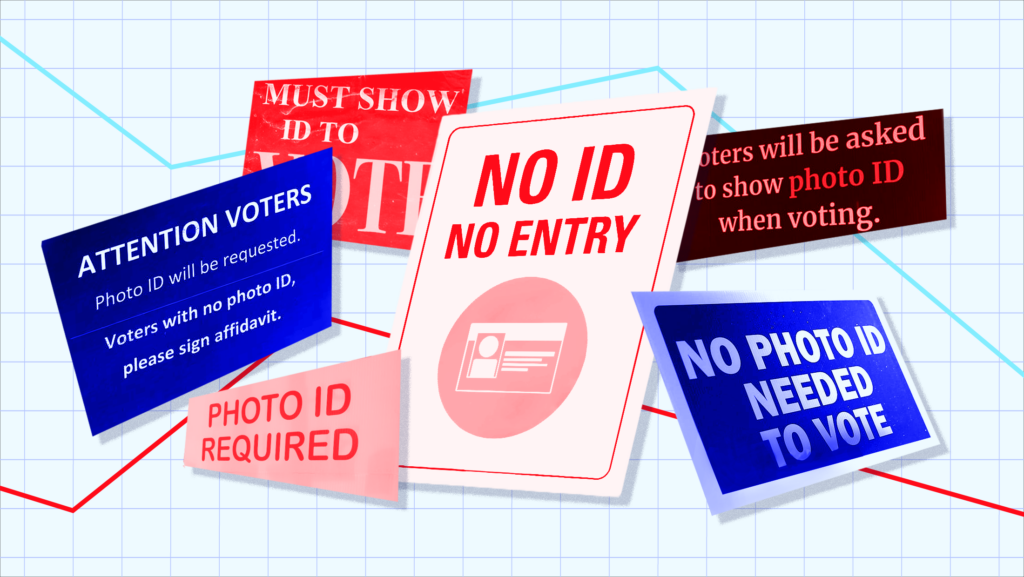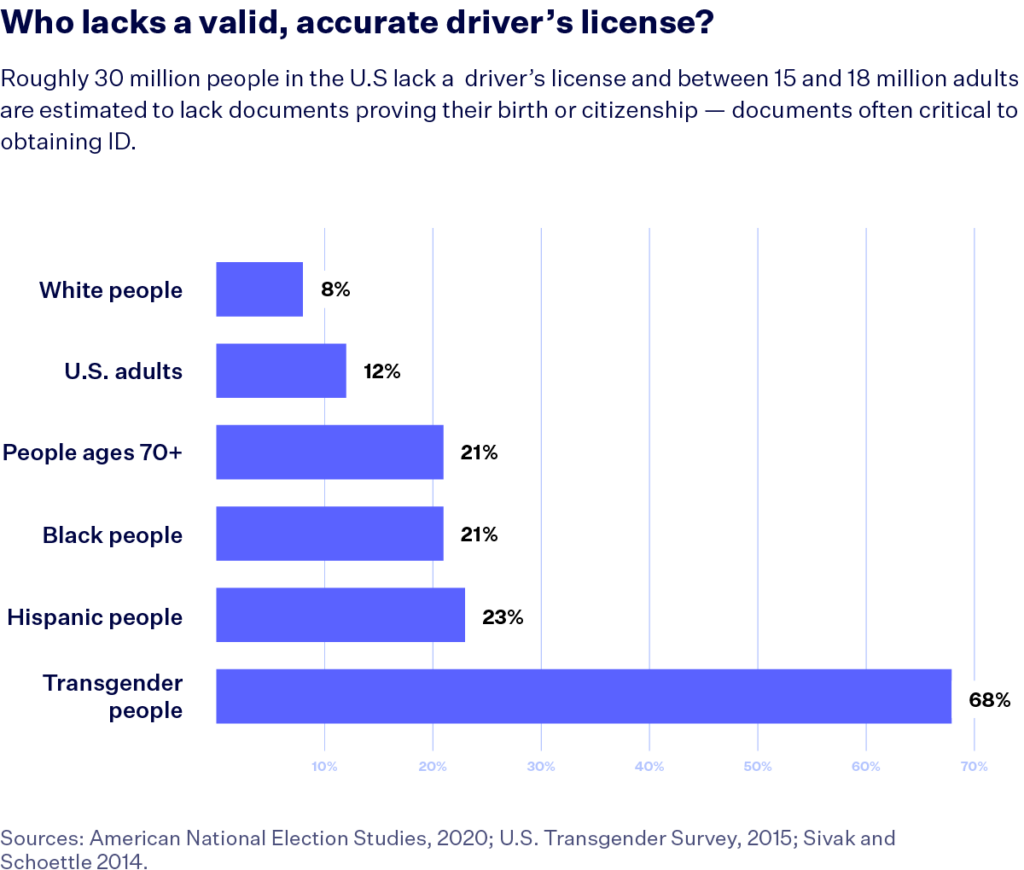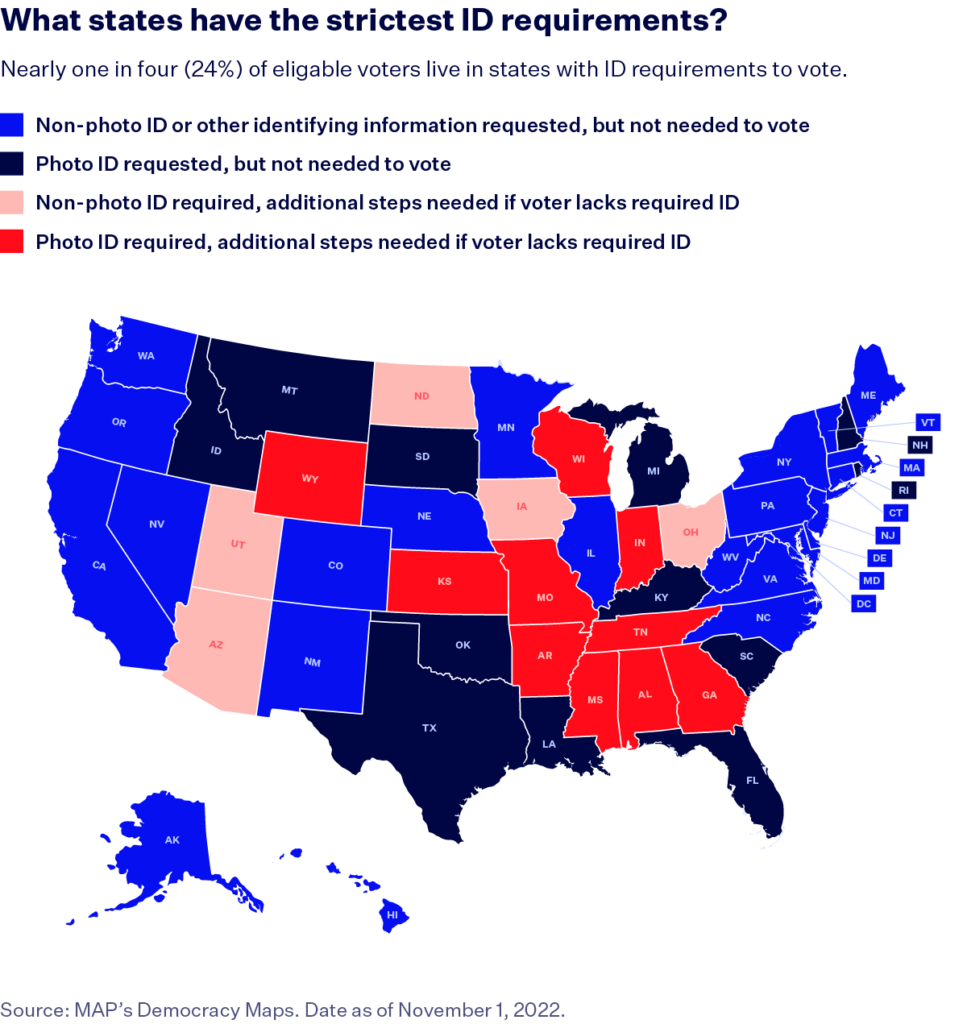How ID Requirements Harm Marginalized Communities and Their Right to Vote

Last fall, the Movement Advancement Project released The ID Divide: How barriers to ID impact different communities and affect everyone. The analysis outlines in grave detail how barriers to obtaining IDs can impact one’s daily life, including voting, which communities are most harmed by restrictive policies and the ways that policymakers can address systemic inequities and barriers that make IDs inaccessible for too many Americans.
A plethora of barriers to obtaining IDs plague millions of Americans.
For some, possessing IDs may seem commonplace and easy to accomplish. A piece of plastic buried deep in a wallet, and often taken for granted. In reality, a multitude of significant barriers exist that keep people from acquiring identification, which has increasingly become a necessity in everyday life.
Reasons an individual might need to change or update their IDs include changing name or citizenship status, updating gender, having an expired ID or moving. Nearly 42 million people moved locations in 2021.
When these updates are needed, Americans are forced down an often long, winding and confusing process. In order to obtain or update new or existing IDs, individuals must present a significant array of other identification documents. As a result, the process can often be circular, with Americans struggling to possess one piece of documentation that can then snowball and block individuals from even getting IDs in the first place.
According to the study, between 15 and 18 million people in the U.S. lack access to documents proving their birth or citizenship, which can be integral to acquiring other forms of IDs.
Identifying documents are also very expensive. Transgender individuals experience this when completing a legal name change to conform with their gender identity. According to the report, 34% of transgender people paid more than $250 to complete the change, with an additional 11% spending more than $500. Even worse, 35% said they had not changed their name because they couldn’t afford the burdensome costs. Birth certificates average over $50 and driver’s licenses cost as much as $89.
Other issues include limited availability of ID services and patchwork policies. Most offices only operate during business hours, and are so sparse that some rural individuals have to travel a significant distance — a cumbersome barrier to those who lack transportation or can not afford to skip work.
Maintaining identification is disproportionately burdensome for minority and low income communities.
Discriminatory and prejudicial ID practices pose major challenges for certain groups and are often rooted in decades of history. During the Jim Crow era, many Black people were denied access to certain hospitals, and many were never given a birth certificate. As such, communities of color are especially likely to lack a driver’s license.
While only 8% of white Americans do not have a driver’s license, 21% of Black Americans and 23% of Hispanic Americans do not have access to this form of ID. Consequences of this are numerous, but one striking example is that 13.8% of Black households lack a checking or savings account compared to just 2.5% of white households. IDs are required to open these accounts.

When it comes to indigenous and Native communities, many are born at home or on Native lands, and therefore do not have birth certificates. While many indigenous nations have their own IDs, they are often not accepted by U.S. officials. Native Americans are also more likely to lack a permanent home address and live in poverty, which can pose major issues for securing IDs like a driver’s license.
Those who are unhoused face a similar problem — they too usually lack a permanent mailing address, which makes proof of residency requirements especially burdensome, and the costs associated with getting an ID can create a nearly insurmountable obstacle.
Transgender individuals especially struggle with obtaining accurate IDs — 68% lack IDs that are reflective of their name and identity, and because of the high costs of acquiring IDs and other pieces of documentation, low-income Americans struggle as well, especially since they are disproportionately likely to work jobs that do not allow for time off to go and acquire IDs.
ID requirements can take a massive toll on voters at the polls.
While lack of ID can be detrimental to numerous facets of life, one of the most significant is the impact it can have on an individual’s right to vote. This was not always the case — before the 2006 election, no state had ever required government-issued photo ID to vote. Now, such requirements exist in numerous states.
Fifteen states require some form of ID to vote, 10 of which must be a photo ID and an additional 12 states request, but do not require, photo ID. Some states also require ID to register to vote, which can similarly cause significant problems. The report highlighted a set of studies in Kansas that found “in just the first four years after the state implemented its voter registration law in 2013, over 63,000 people were blocked from registering to vote,” almost all of whom were eligible to vote.

Republicans in Georgia also nefariously exploited voter IDs. In 2017, the state passed a law requiring an “exact match” between an individual’s name on their ID and on their voter registration. The next year, over 51,000 people were flagged — 80% of which were Black, Latino or Asian — and the discrepancies were as small as John versus Johnathan. A lawsuit led to the law being overturned in 2019.
Numerous studies have shown that strict photo ID requirements to vote depress turnout and disproportionately harm certain communities, including voters of color and young voters.
Despite clear data, Republicans continue to press for strict ID requirements in the courts.
While the dangers of strict ID requirements for voting, especially for vulnerable communities, are crystal clear, Republicans don’t seem to care. In states throughout the country, they are actively litigating in favor of draconian voter suppression laws that exploit the difficulties of procuring identification in the name of “election integrity.”
In Idaho, Republicans are defending a newly enacted voter suppression law that eliminates the use of a student ID as an acceptable form of ID for in-person voting. As the study notes, securing photo IDs can be especially cumbersome for young people, and student IDs are one of the easiest and affordable ways for students to prove their identity. The plaintiffs in the case, March for Our Lives Idaho and an organization of retired trade union members, claim the legislation is a “surgical attack on young Idaho’s young voters.”
Litigation is ongoing in a consolidated lawsuit out of Georgia that challenges the state’s voter suppression law. Among the provisions being challenged is one that requires voters applying for a mail-in ballot to provide a driver’s license, a state identification card or a copy of an alternative identification in order to vote.
Ohio, which once allowed an extensive list of accepted IDs, passed a law at the start of the year requiring one of just four forms of voter ID — a driver’s license, state identification card, passport or military identification — in order to vote in person. A lawsuit challenging the legislation alleges that the restrictions heavily restrict Ohioans’ access to the polls and particularly burdens young, elderly, Black and overseas voters.
These needless and discriminatory barriers to IDs can be fixed.
The report lays out multiple pathways for more accessible IDs, and in turn a more inclusive democracy. First, requiring IDs as a practice at all should be reexamined. Describing a “collective reflex” to request government-issued ID at every turn, the report emphasizes that IDs should only be requested if entirely necessary to access basic needs and essential services of everyday life — which, in the case of voting, it is not.
If IDs are going to be necessary, states should simplify documentation requirements and processes whenever possible. That means getting rid of circular ID requirements, and removing excess barriers that harm specific groups, like gender markers on IDs or banning alternatives to permanent mailing addresses.
Given that IDs are increasingly required in day-to-day life, the report notes that they should be as affordable as possible. Eliminating the cost of acquiring drivers licenses, passports or birth certificates could alleviate the burden of ID requirements and address inequities. Similarly, the report recommends that IDs are as easy to get as possible, which could be done with expanded hours, the utilization of mobile and online services and education public education and outreach about opportunities for securing identification.
Additional recommendations include minimum federal standards for ID accessibility and the reduction of discrimination in both policies and policy administration, which could be achieved through staff training and outreach programs to communities most burdened by discriminatory policies.
Movement Advancement Project’s report exposes numerous systemic problems to obtaining IDs and makes clear the serious burdens one can face if they do not have proper identification. The report argues that one’s voting rights should not be dependent on their demographic nor income status, yet that is the reality for many. Fortunately, it doesn’t have to be this way — lawmakers simply need to act.
By Mac Brower, former Democracy Docket Staff Writer